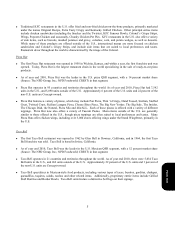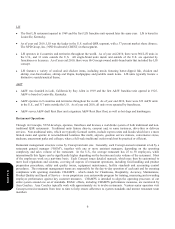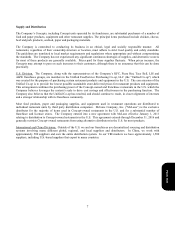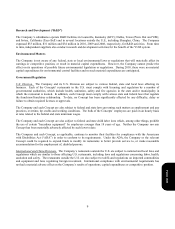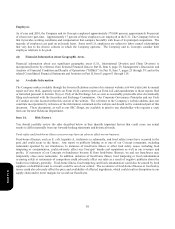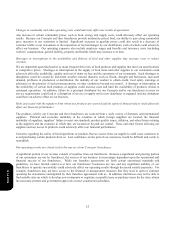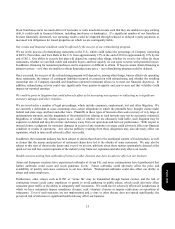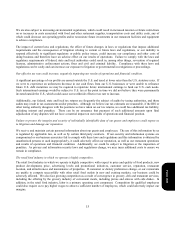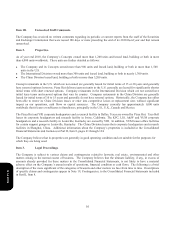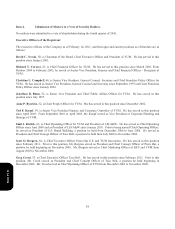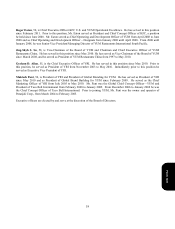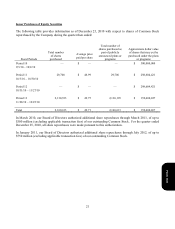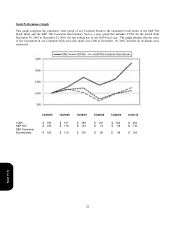Pizza Hut 2010 Annual Report Download - page 110
Download and view the complete annual report
Please find page 110 of the 2010 Pizza Hut annual report below. You can navigate through the pages in the report by either clicking on the pages listed below, or by using the keyword search tool below to find specific information within the annual report.
13
If our franchisees incur too much debt or if economic or sales trends deteriorate such that they are unable to repay existing
debt, it could result in financial distress, including insolvency or bankruptcy. If a significant number of our franchisees
become financially distressed, our operating results could be impacted through reduced or delayed royalty payments or
increased rent obligations for leased properties on which we are contingently liable.
Our results and financial condition could be affected by the success of our refranchising program.
We are in the process of refranchising restaurants in the U.S., which could reduce the percentage of Company ownership
of KFCs, Pizza Huts, and Taco Bells in the U.S. from approximately 15% at the end of 2010 to approximately 12% by the
end of 2011. Our ability to execute this plan will depend on, among other things, whether we receive fair offers for these
restaurants, whether we can find viable and suitable buyers and how quickly we can agree to terms with potential buyers.
In addition, financing for restaurant purchases can be expensive or difficult to obtain. If buyers cannot obtain financing at
attractive prices – or if they are unable to obtain financing at any price – our refranchising program could be delayed.
Once executed, the success of the refranchising program will depend on, among other things, buyers effectively operating
these restaurants, the impact of contingent liabilities incurred in connection with refranchising, and whether the resulting
ownership mix of Company-operated and franchisee-operated restaurants allows us to meet our financial objectives. In
addition, refranchising activity could vary significantly from quarter-to-quarter and year-to-year and that volatility could
impact our reported earnings.
We could be party to litigation that could adversely affect us by increasing our expenses or subjecting us to significant
monetary damages and other remedies.
We are involved in a number of legal proceedings, which include consumer, employment, tort and other litigation. We
are currently a defendant in cases containing class action allegations in which the plaintiffs have brought claims under
federal and state wage and hour and other laws. Plaintiffs in these types of lawsuits often seek recovery of very large or
indeterminate amounts, and the magnitude of the potential loss relating to such lawsuits may not be accurately estimated.
Regardless of whether any claims against us are valid, or whether we are ultimately held liable, such litigation may be
expensive to defend and may divert time and money away from our operations and hurt our performance. With respect to
insured claims, a judgment for monetary damages in excess of any insurance coverage could adversely affect our financial
condition or results of operations. Any adverse publicity resulting from these allegations may also adversely affect our
reputation, which in turn could adversely affect our results.
In addition, the restaurant industry has been subject to claims that relate to the nutritional content of food products, as well
as claims that the menus and practices of restaurant chains have led to the obesity of some customers. We may also be
subject to this type of claim in the future and, even if we are not, publicity about these matters (particularly directed at the
quick service and fast-casual segments of the industry) may harm our reputation and adversely affect our results.
Health concerns arising from outbreaks of viruses or other diseases may have an adverse effect on our business.
Asian and European countries have experienced outbreaks of Avian Flu, and some commentators have hypothesized that
further outbreaks could occur and reach pandemic levels. Future outbreaks could adversely affect the price and
availability of poultry and cause customers to eat less chicken. Widespread outbreaks could also affect our ability to
attract and retain employees.
Furthermore, other viruses such as H1N1 or “swine flu” may be transmitted through human contact, and the risk of
contracting viruses could cause employees or guests to avoid gathering in public places, which could adversely affect
restaurant guest traffic or the ability to adequately staff restaurants. We could also be adversely affected if jurisdictions in
which we have restaurants impose mandatory closures, seek voluntary closures or impose restrictions on operations of
restaurants. Even if such measures are not implemented and a virus or other disease does not spread significantly, the
perceived risk of infection or significant health risk may affect our business.
Form 10-K




